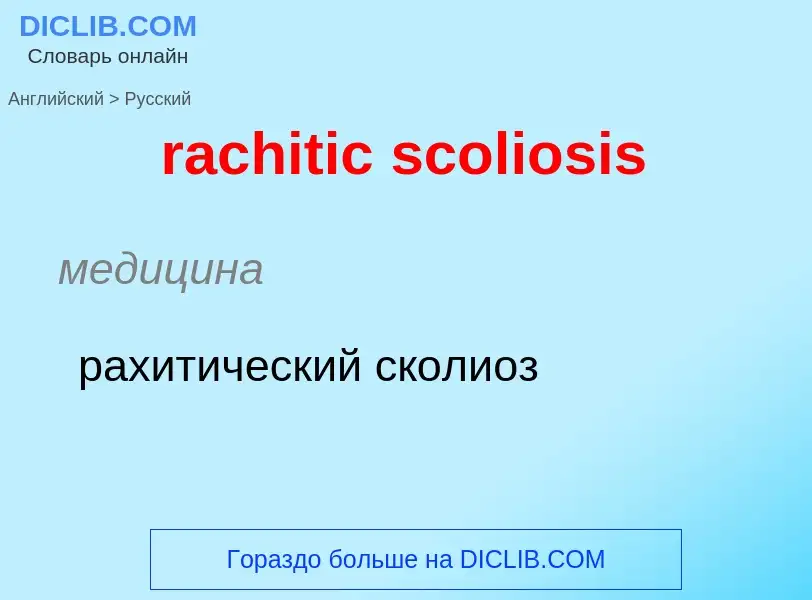Traducción y análisis de palabras por inteligencia artificial ChatGPT
En esta página puede obtener un análisis detallado de una palabra o frase, producido utilizando la mejor tecnología de inteligencia artificial hasta la fecha:
- cómo se usa la palabra
- frecuencia de uso
- se utiliza con más frecuencia en el habla oral o escrita
- opciones de traducción
- ejemplos de uso (varias frases con traducción)
- etimología
rachitic scoliosis - traducción al ruso
медицина
рахитический сколиоз
медицина
идиопатический сколиоз
Definición
Wikipedia

Scoliosis is a condition in which a person's spine has a sideways curve. The curve is usually "S"- or "C"-shaped over three dimensions. In some, the degree of curve is stable, while in others, it increases over time. Mild scoliosis does not typically cause problems, but more severe cases can affect breathing and movement. Pain is usually present in adults, and can worsen with age.
The cause of most cases is unknown, but it is believed to involve a combination of genetic and environmental factors. Risk factors include other affected family members. It can also occur due to another condition such as muscle spasms, cerebral palsy, Marfan syndrome, and tumors such as neurofibromatosis. Diagnosis is confirmed with X-rays. Scoliosis is typically classified as either structural in which the curve is fixed, or functional in which the underlying spine is normal.
Treatment depends on the degree of curve, location, and cause. The age of the patient is also important, since some treatments are ineffective in adults, who are no longer growing. Minor curves may simply be watched periodically. Treatments may include bracing, specific exercises, posture checking, and surgery. The brace must be fitted to the person and used daily until growing stops. Specific exercises, such as exercises that focus on the core, may be used to try to decrease the risk of worsening. They may be done alone or along with other treatments such as bracing. Evidence that chiropractic manipulation, dietary supplements, or exercises can prevent the condition from worsening is weak. However, exercise is still recommended due to its other health benefits.
Scoliosis occurs in about 3% of people. It most commonly develops between the ages of ten and twenty. Females typically are more severely affected than males with a ratio of 4:1. The term is from Ancient Greek σκολίωσις (skolíōsis), which means "a bending".


![A 14–15th-century woman who had severe scoliosis, and died at about 35 years, Limburgs Museum [[Venlo]] A 14–15th-century woman who had severe scoliosis, and died at about 35 years, Limburgs Museum [[Venlo]]](https://commons.wikimedia.org/wiki/Special:FilePath/Abnormal bone growth.jpg?width=200)

 (14772101745).jpg?width=200)


